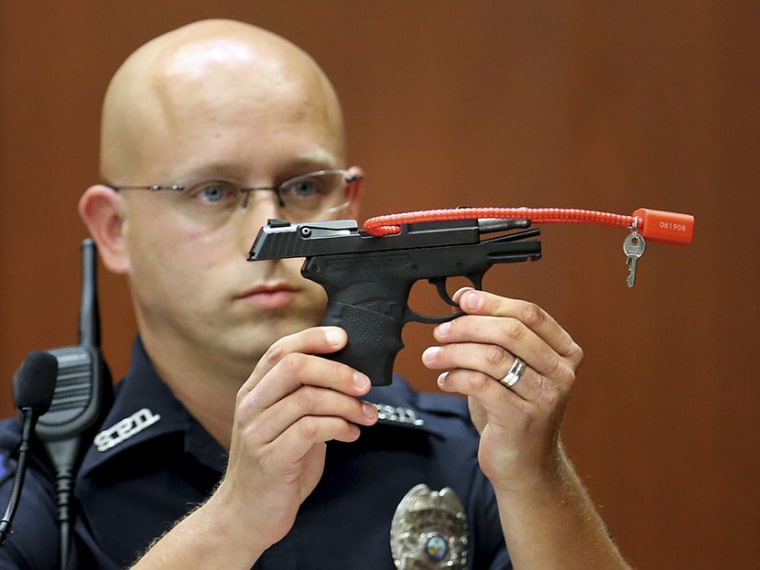UPDATED at 6:15 p.m. - Now that he's been acquitted by a Florida jury, George Zimmerman has the ability to take back the gun that he admits he used to shoot and kill Trayvon Martin.
Shortly after the verdict was read Saturday evening, Judge Debra Nelson said evidence in the trial would be released, meaning Zimmerman—who legally owned the gun—can take it back into his possession if he wants.
"Florida law prohibits persons convicted of felonies in a state court from possessing a handgun. Zimmerman, however, was acquitted," University of Florida Law Professor Darren Hutchinson told msnbc.com.
The gun was a key piece of evidence in the case for both sides. Zimmerman's friend Mark Osterman, an air marshall who testified in the case that he and Zimmerman often discussed gun safety, described the 9mm Keltec handgun as the right choice "if you need to protect yourself and you need to do it right now."
Prosecutors argued that the location of the gun was of paramount importance, and claimed during closing arguments that Zimmerman's description of where he kept the gun would have made it impossible for Martin to see and reach for it. Zimmerman said in multiple interviews with law enforcement that he felt he needed to shoot Martin as an act of self-defense to protect himself when Martin reached for his gun and verbally threatened him, a key justification of his not-guilty plea.
Special Prosecutor Angela Corey noted that the case had "never been about the right to bear arms" in the remarks she made to reporters after the verdict was read.
"This case has never been about race, nor has it never been about the right to bear arms, not in the sense of proving this as a criminal case," she said.
"But the right to bear arms is right in which we all believe. I especially believe in that right," she added later. "What we want is responsible use when someone feels they have to use a gun to take a life. They have to be responsible in their use and we believe that this case was all the long was about boundaries and that George Zimmerman exceeded those boundaries."
Hutchinson notes that it's still possible Zimmerman could lose his gun rights if federal prosecutors pursue felony charges against him in the future and win in court.
"The same statute, however, applies to persons convicted of a federal felony," he added. "At this moment, however, federal prosecutors have not charged Zimmerman with a crime, not to mention secured a conviction. If he is convicted of a federal felony related to this act, under Florida law, he would lose his right to carry a handgun."
NBC News producers Rob Rivas and Jamie Novogrod contributed to this report.
Editor’s note: George Zimmerman has sued NBC Universal for defamation. The company strongly denies the allegation.
Correction: An earlier version of this story stated that Zimmerman's attorney Mark O'Mara said his client had been given back his gun, which NBC News has not confirmed.
